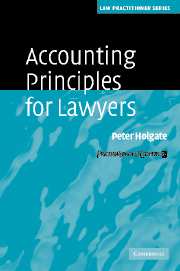Book contents
- Frontmatter
- Contents
- Acknowledgements
- Glossary of terms
- Part I The accounting environment
- 1 Introduction
- 2 UK GAAP and international harmonisation
- 3 The legal framework for accounting
- 4 Substance over form
- 5 The accounting profession and the regulatory framework for accounting and auditing
- 6 Communicating accounting information
- 7 Current trends in accounting
- Part II Some specifics
- Appendices
- Index
4 - Substance over form
from Part I - The accounting environment
Published online by Cambridge University Press: 28 July 2009
- Frontmatter
- Contents
- Acknowledgements
- Glossary of terms
- Part I The accounting environment
- 1 Introduction
- 2 UK GAAP and international harmonisation
- 3 The legal framework for accounting
- 4 Substance over form
- 5 The accounting profession and the regulatory framework for accounting and auditing
- 6 Communicating accounting information
- 7 Current trends in accounting
- Part II Some specifics
- Appendices
- Index
Summary
Form v. substance
Financial statements drawn up under the Companies Act 1985 are in many ways legal documents. In a literal sense they are required to be produced by law, and to be filed at Companies House. In another sense, too, they must comply with the many detailed requirements of the Act. Yet, there is a strong notion of ‘substance’ in accounting. This has become stronger in the last twenty years or so. In earlier, simpler, times, following the legal form of a transaction generally gave an appropriate accounting result. But, as business transactions have become more complex, there have been an increasing number of transactions in which legal form and economic substance have diverged from each other; gradually, it became clear that following the legal form did not properly reflect the commercial transaction.
To accountants, the basic legal requirement that accounts must give a ‘true and fair view’ (discussed in chapter 3 at pp. 26–7) means that they must reflect the economic substance of a transaction and not just its legal form. This is not stated in law; it is merely the accepted view of accountants.
Early examples
For some years, there were examples of substance over form being applied to common transactions, almost as second nature, rather than by applying a specific rule or even consciously applying the substance over form principle. One example is accounting for an asset being ‘bought’ under hire purchase.
Information
- Type
- Chapter
- Information
- Accounting Principles for Lawyers , pp. 48 - 55Publisher: Cambridge University PressPrint publication year: 2006
